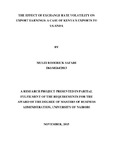| dc.description.abstract | Kenya’s export earnings are a key contributor to the country’s economic growth. Kenya actively trades with other nations of the world among them the East Africa Community with Uganda being the leading destination of Kenya’s exports. The opening up to the global market has made Kenya witness currency fluctuations especially between the Kenyan shilling and the US Dollar. With such exchange rate fluctuations are uncertainties that affect the export earnings of a country. The objective of this study was to determine the effect of exchange rate volatility on export earnings with reference to Kenya’s exports to Uganda. The study used secondary data in order to achieve the stated research objective. The data was obtained from Kenya Revenue Authority, Kenya National Bureau of Statistics and Central Bank of Kenya. Export earnings were analysed with the exchange rate volatility for the period of five years (2010-2014). Other variables of the study were interest rates and inflation rates. This was to understand how these factors affect export earnings to Uganda. In order to test the relationship between export earnings and exchange rate volatility, interest rates and inflation rates, multiple regression was employed. The study found exchange rate volatility affects Kenya’s export earnings to Uganda.
There is need for the policy makers to ensure adequate monitoring of the exchange rate and ensure that the rate is stable, because its stability will in turn enhance or increase economic growth. The monetary authorities should play a critical role in creating an enabling environment for growth. The determination of the optimal lending rate should reflect the overall internal rate of returns in the productive sector with due attention to market fundamentals. The Central Bank should be given some instrument autonomy. Effective monetary targeting and accommodating monetary policies should be designed and implemented as the needs arise. There is also need for the government to ensure price stability, as this help to reduce the pressure on general price level. High inflation rate in an economy would hamper economic growth. Other studies in this area should be carried out to ascertain the effect of other factors not accounted for in this study on earnings in Kenya. This study covered a period of five years. There is need to consider a longer duration of study to see whether the results will be consistent. | en_US |

